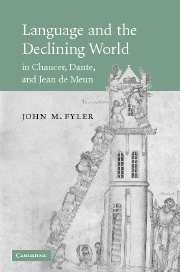3 - Dante and Chaucer's Dante
Published online by Cambridge University Press: 13 January 2010
Summary
ADAM'S LANGUAGE AND OURS
Of the writers to whom Chaucer is indebted, Dante is the most interested in the history and theory of language, and the most inclined to examine such matters fully. At the beginning of the Convivio and in his treatise on eloquence in the vernacular, Dante explains his theories of language at some length; ideas about the history and signifying power of speech even more notably pervade the Commedia. Whether Chaucer's debt is to Dante's prose exposition of his ideas, or more probably to his poetic treatment of them, that debt is apparent in the House of Fame, which attends carefully to Dante's views primarily to subvert them. The House of Fame constitutes Chaucer's first and most exhaustive thinking through of Dante's work, as he skeptically examines and makes use of the Commedia. The ideas that he adapts and reacts to in this early poem continue to appear in his later poetry, in more distilled and abstract forms. As befits their prominence in his thought and poetic practice, Dante's ideas on language have been examined by many critics, but they have a particular resonance in a Chaucerian context, as well as in the context of medieval Genesis commentaries; and they provide a useful reference point for discussing all of Chaucer's major poems from the House of Fame on.
- Type
- Chapter
- Information
- Publisher: Cambridge University PressPrint publication year: 2007

